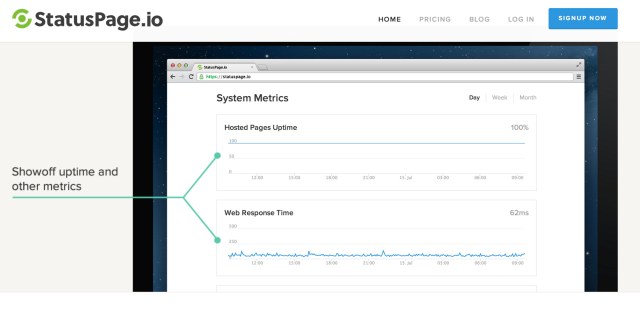Y Combinator-backed StatusPage is in the fortunate position of having paying customers like Jawbone, Shopify, New Relic, Parse, Ping Identity and Zendesk, ahead of today’s official debut. The startup, as you may have guessed, offers a hosted status page for any company with a website, service or application. It’s the kind of thing many businesses want to offer their customers, but often don’t have the time or resources to build themselves.
The company was started last October by co-founders (and brothers) Steve and Scott Klein. They later added third co-founder Danny Olinsky in May. The Kleins had previously sold their mobile app building company to musicians resource ReverbNation before leaving to do contract work while figuring out their next move.
The decision to offer a service for hosted status pages — the pages that report downtime and other metrics to a business’s customers — made sense to the founders, who discovered there was a strong desire for something like this at smaller companies in particular. “It was unanimous across the board: ‘Yes, I want one of these. I’ll definitely pay for it. I just don’t have the time or the energy to do it,'” Scott says of developer response to the idea.
With StatusPage’s service, a business can sign up for free to build their status page internally, then pay if they choose to make it public-facing and under their own branding and domain. The page can track whatever metrics are important to the business, like API response time, background jobs, errors, outages and more. The service also recently added support for data pulled from third parties like Pingdom, New Relic, Datadog, TempoDB, Webmon, and Librato, for example.
In addition to showing the items being tracked and their current status, StatusPage also allows companies to communicate to customers about the problems and how they’re being resolved, both on the site, as well as via email or text. Beneath the page’s dashboard and accompanying graphs, a history of previous incident reports is also available. (Here’s an example.)
The basic plan is $19 per month and includes the page and domain (e.g. status.companyname.com). For $79 per month, businesses also get support for SMS notifications and customized metrics — whatever their customers pay for and care about tracking. Business and enterprise plans are also available.
Scott says that the entire time it takes for a company to get their page set up and ready to go is realistically around 15 to 30 minutes at most. “One of the reasons people don’t do this is because they’re strapped for development time,” he says. “So one of the challenges for us is to really get this done without any developer time.” The page can actually be set up by anyone who knows the basic CSS colors and has the images the company wants to use (like a logo), Scott explains; that could be a somewhat technical office staffer if developers are too busy.
The team plans to make the StatusPage sites even more customizable, allowing businesses to be specific about which services are affecting which users. For instance, when multi tenancy is involved, businesses’ communication could be very granular, only showing relevant information to the affected customers, not everyone.
StatusPage, which competes with things like Stashboard, Offsitestatus and Whiskerboard, had privately launched on Hacker News ahead of today’s “public” debut. It has since seen 450 registered accounts, over 50 of which are now paying customers.
The small team of three is based in Mountain View due to their participation in YC, but they plan to spread back out and work remotely going forward, with one (Danny) remaining in the area, while Scott and Steve return to Fort Collins, Colo., and Durham, N.C., respectively. There are no immediate plans to raise additional funds.

